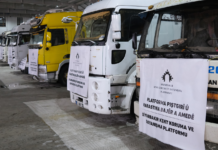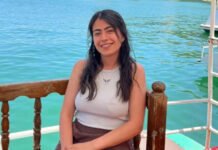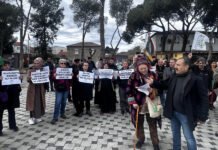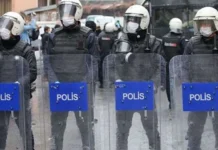The remains of a young man who was killed during clashes between Turkish security forces and the outlawed Kurdistan Worker’s Party (PKK) in January 2016 were returned to his father in a plastic bag nearly seven years after his death, Turkish media reported.
Ali Rıza Arslan received the remains of his son, Hakan Arslan, at the Diyarbakır courthouse in southeastern Turkey. Photographs circulating on social media show the father leaving the courthouse carrying the plastic bag containing his son’s bones.
Arslan’s remains were discovered by workers at an excavation site in February 2021. His parents provided DNA samples to prove the bones belonged to their son. Although the test came back positive in November 2021, they had to wait another 10 months to collect his remains.
Images of the old father carrying his son in a plastic bag sparked outrage among the Turkish public.
Journalist Nurcan Baysal said she had witnessed the ordeal Arslan’s family experienced in the process of retrieving their son’s remains. “If you asked me what war is, I would point to this photograph,” she said.
Hakan Arslan’ın ailesinin evlatlarının kemiklerini almak için verdikleri mücadelenin yakından tanığıyım.
“Savaş nedir?” diye soranlara gösterirsiniz bu fotoğrafı?
Bu poşette gencecik bir evladın kemikleri var😔 https://t.co/yGvBh7HVLz— Nurcan Baysal (@baysal_nurcan) August 29, 2022
Journalist Fehim Taştekin said handing over remains in a plastic bag was unethical. He added that the Diyarbakır Bar would file a complaint with Turkey’s Council of Judges and Prosecutors (HSK) against the prosecutor who was responsible for it.
Diyarbakır Barosu, Sur’da sokağa çıkma yasakları sırasında ölen Hakan Arslan’ın cenazesini 7 yıl sonra bir torba içinde ailesine teslim eden savcı hakkında HSK'ye başvurdu:
Kemiklerin torbada verilmesi işkencedir https://t.co/N6qNCS24EO— Fehim Taştekin (@fehimtastekin) August 29, 2022
The Human Rights Foundation (IHD) also expressed outrage and added that such practices had become common. “Everybody deserves to be treated with dignity and respect after their death,” they said in a statement posted on Twitter.
The IHD added that they would appeal to the Constitutional Court so the authorities who were responsible for such disrespect of Arslan’s remains would be held accountable.
Diyarbakır’ın Sur ilçesinde 2 Aralık 2015 tarihinde ilan edilen sokağa çıkma yasağı sürecinde yaşanan çatışmalarda yaşamını yitiren, Hakan Arslan'a ait cenazenin başvurucumuz aileye kutu içinde verilmesine dair açıklamamız: pic.twitter.com/TRK5twfqmY
— İHD Amed (@amedihd) August 29, 2022
The PKK has been leading an armed insurgency against Turkey’s security forces since the ’80s in a campaign that has claimed the lives of some 40,000 people. The group is listed as a terrorist organization by Turkey and much of the international community.
The negotiations between the PKK and the government, also known as the Kurdish Peace Process, took place between 2013 and 2015. The process started with PKK’s imprisoned leader Abdullah Öcalan declaring it was time to end armed conflict in a letter that was read publicly. A ceasefire was achieved, and both sides tried to keep the ceasefire in place.
However, following a series of altercations on August 11, 2015, Turkish President Recep Tayyip Erdoğan announced that they had put the peace process “on ice.” Following the announcement armed clashes broke out in several towns in southeastern Turkey.
Sur, the historic center of Diyarbakir, witnessed armed clashes between Turkish security forces and the PKK in early December 2015. The clashes continued for two months, and 40,000 residents had to leave the area. Many buildings and historic sites were destroyed during the military operations.
During the clashes the Turkish government ordered curfews in several towns and neighborhoods. However, civilian deaths were regularly reported by media and human rights organizations during curfews, and 220 civilians were reportedly killed. There was also a rise in reports of serious ill-treatment in detention.
None of the military personnel who were involved in the killings and mistreatment were convicted.















